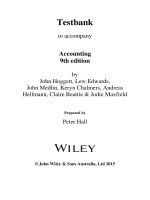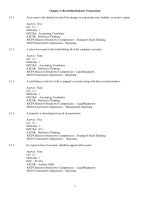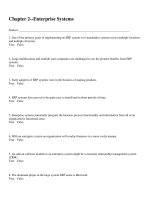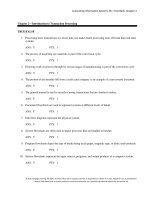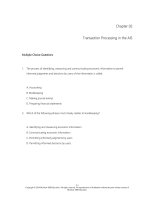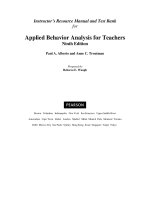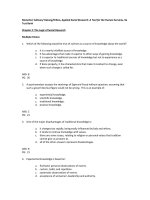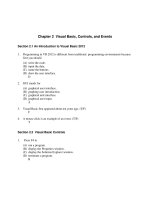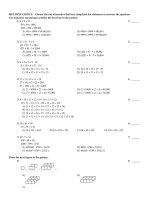Electronic devices conventional current version 9th edition floyd test bank
Bạn đang xem bản rút gọn của tài liệu. Xem và tải ngay bản đầy đủ của tài liệu tại đây (407.15 KB, 9 trang )
TRUE/FALSE. Write 'T' if the statement is true and 'F' if the statement is false.
1) A diode conducts current when forward-biased and blocks current when reverse-biased.
1) _______
2) The larger the ripple voltage, the better the filter.
2) _______
3) Clamping circuits use capacitors and diodes to add a dc level to a waveform.
3) _______
4) Reverse bias permits full current through a pn junction.
4) _______
5) One of the advantages of using transformer coupling in a half-wave rectifier is that it allows the
ac source to be directly connected to the load.
5) _______
6) The PIV rating of a diode in a full-wave bridge rectifier is more than that required for a full-wave
center-tapped configuration.
6) _______
MULTIPLE CHOICE. Choose the one alternative that best completes the statement or answers the question.
7) A typical value of reverse breakdown voltage in a diode is
7) _______
A) 50 V or larger.
B) 0.7 V.
C) 0 V.
D) 0.3 V.
8) A typical value of reverse breakdown voltage in a diode is
A) 0.3 V.
B) 0 V.
C) 50 V or larger.
8) _______
D) 0.7 V.
9) The small current when a diode is reverse-biased is called
A) reverse breakdown current.
B) forward-bias current.
C) conventional current.
D) reverse-leakage current.
9) _______
10) As the forward current through a forward-biased diode decreases, the voltage across the diode
A) increases and then decreases.
B) increases.
C) is relatively constant.
D) immediately drops to 0 V.
10) ______
11) The resistance of a forward-biased diode is
A) minimal below the knee of the curve.
C) minimal above the knee of the curve.
11) ______
B) infinite.
D) perfectly linear.
12) A reverse-biased diode has the ________ connected to the positive side of the source, and the
________ connected towards the negative side of the source.
A) base, anode
B) anode, cathode
C) cathode, base
D) cathode, anode
12) ______
13) The forward voltage across a conducting silicon diode is about
A) 0.7 V.
B) -0.3 V.
C) 1.3 V.
13) ______
D) 0.3 V.
14) Reverse bias is a condition that essentially ________ current through the diode.
A) amplifies
B) increases
C) prevents
D) allows
14) ______
15) What must be used in series with a forward-biased diode to prevent damage due to excessive
current?
A) Ammeter
B) NC switch
C) Resistor
D) Nothing is required.
15) ______
16) The knee voltage of a diode is approximately equal to the
A) reverse voltage.
B) applied voltage.
16) ______
C) breakdown voltage.
D) barrier potential.
17) A silicon diode measures a high value of resistance with the meter leads in both positions. The
trouble, if any, is
A) the diode is internally shorted.
B) the diode is open.
C) nothing; the diode is good.
D) the diode is shorted to ground.
17) ______
18) How much forward diode voltage is there with the ideal-diode approximation?
A) 0.7 V
B) 1 V
C) More than 0.7 V
D) 0 V
18) ______
19) A DMM measures 0.13 Ω in both directions when testing a diode. The diode is
A) constructed of Si and is good.
B) open.
C) shorted.
D) operating normally.
19) ______
20) On diode check, a shorted diode will measure
A) 0.3 V.
B) 0.79 V.
20) ______
21) A nonconducting diode is ________ biased.
A) forward
B) reverse
C) 0 V.
D) 0.7 V.
21) ______
C) poorly
22) The application of a dc voltage to control diode conduction is called
A) oscillation.
B) a pn junction.
C) bias.
D) inverse
22) ______
D) amplification.
23) A reverse-biased silicon diode is connected in series with a 12 V source and a resistor. The
voltage across the resistor is
A) 0.7 V.
B) 0 V.
C) 0.3 V.
D) 12 V.
23) ______
24) A reverse-biased silicon diode is connected in series with a 12 V source and a resistor. The
voltage across the diode is
A) 0.3 V.
B) 0 V.
C) 0.7 V.
D) 12 V.
24) ______
25) A diode is operated in reverse bias. As the reverse voltage is decreased, the depletion region
A) widens.
B) has a constant width.
C) is not related to reverse voltage.
D) narrows.
25) ______
26) If the positive lead of an ohmmeter is placed on the cathode and the negative lead is placed on
the anode, which of the following readings would indicate a defective diode?
A) 1 MΩ
B) ∞ Ω
C) 0 Ω
D) 400 kΩ
26) ______
27) The diode in a half-wave rectifier conducts for ________ of the input cycle.
A) 90°
B) 45°
C) 180°
27) ______
28) A full-wave bridge rectifier uses ________ diode(s) in a bridge circuit.
A) 3
B) 1
C) 2
D) 0°
28) ______
D) 4
29) A silicon diode is connected in series with a 10 kΩ resistor and a 12 V battery. If the cathode of
the diode is connected to the positive terminal of the battery, the voltage from the anode to the
negative terminal of the battery is
A) 12 V.
B) 0.7 V.
C) 11.3 V.
D) 0 V.
29) ______
30) Refer to the figure above. If the voltmeter across the transformer secondary reads 0 V, the
probable trouble is that
A) the filter capacitor is open.
B) the inductor is open.
C) the transformer secondary is open.
D) one of the diodes is open.
E) No trouble exists; everything is normal.
30) ______
31) Refer to the figure above. In servicing this power supply, you notice that the ripple voltage is
higher than normal and that the ripple frequency has changed to 60 Hz. The probable trouble is
that
A) the filter capacitor has opened.
B) a diode has shorted.
C) a diode has opened.
D) the inductor has opened.
31) ______
32) Refer to the figure above. This oscilloscope trace indicates the output from
A) a full-wave filtered rectifier with an open diode.
B) a full-wave filtered rectifier.
C) a full-wave rectifier with no filter and an open diode.
D) a half-wave filtered rectifier.
32) ______
33) Refer to the figure above. The trace on this oscilloscope indicates the output from
A) a full-wave filtered rectifier with an open diode.
B) a half-wave rectifier with no filter.
C) a full-wave filtered rectifier.
D) a full-wave rectifier with no filter.
33) ______
34) Refer to the figure above. This is the output from
A) a full-wave filtered rectifier.
B) a half-wave rectifier with no filter.
C) a full-wave rectifier with no filter and an open diode.
D) a full-wave filtered rectifier with an open diode.
34) ______
35) Refer to the figure above. This trace shows the output from
A) a half-wave rectifier with an open diode.
B) a full-wave filtered rectifier with an open diode.
C) a half-wave rectifier with no filter.
35) ______
D) a full-wave rectifier with no filter and an open diode.
36) Refer to the figure above. These circuits are known as
A) amplifiers.
B) clampers.
C) rectifiers.
36) ______
D) clippers.
Figure I
Figure II
37) Which of the circuits in Figure I will produce the signal in Figure II (a)?
A) (a)
B) (b)
C) (c)
37) ______
D) (d)
38) Which of the circuits in Figure I will produce the signal in Figure II (b)?
A) (a)
B) (b)
C) (c)
D) (d)
39) Which of the circuits in Figure I will produce the signal in Figure II (c)?
A) (a)
B) (b)
C) (c)
D) (d)
40) Which of the circuits in Figure I will produce the signal in Figure II (d)?
A) (a)
B) (b)
C) (c)
D) (d)
38) ______
39) ______
40) ______
41) Refer to (c) in the figure above. This rectifier arrangement
A) is incorrectly connected.
B) will produce a negative output voltage.
C) will produce a positive output voltage.
D) A or C above.
41) ______
42) Refer to (d) in the figure above. This rectifier arrangement
A) will produce a negative output voltage.
B) is incorrectly connected.
C) will produce a positive output voltage.
D) None of the above.
42) ______
43) A silicon diode has a voltage to ground of 117 V from the anode. The voltage to ground from the
cathode is 117.7 V. The diode is
A) reverse-biased.
B) shorted.
C) forward-biased.
D) conducting.
43) ______
44) Refer to the figure above. The probable trouble, if any, indicated by these voltages is
A) an open transformer secondary.
B) one of the diodes is open.
C) the filter capacitor is open.
D) an open transformer primary.
E) the inductor is open.
44) ______
45) Refer to the figure above. If the voltmeter across the transformer secondary reads 0 V, the
probable trouble, if any, would be
A) the inductor is open.
B) the inductor is shorted.
C) one of the diodes is open.
D) an open transformer primary.
45) ______
46) Refer to the figure above. Which oscilloscope trace indicates the output from a filtered full-wave
rect ifier
with an
open
diode?
46)
A) (a)
___
___
B) (b)
47) The ripple frequency of a bridge rectifier is
A) four times the input frequency.
C) one-half the input frequency.
C) (c)
D) (d)
47) ______
B) double the input frequency.
D) the same as the input frequency.
48) Refer to the figure above. The correct diode arrangement to supply a positive output voltage is
A) (a).
B) (b).
C) (c).
D) (d).
48) ______
49) With a half-wave rectified voltage across a load resistor, load current exists for what part of a
cycle?
A) 360 degrees
B) 90 degrees
C) 0 degrees
D) 180 degrees
49) ______
50) When a 60 Hz sinusoidal signal voltage is applied to the input of a half-wave rectifier, the output
frequency is
A) 30 Hz.
B) 60 Hz.
C) 120 Hz.
D) 90 Hz.
50) ______
51) The average value of the half-wave rectified output voltage is approximately ________ of Vp.
A) 31.8%
B) 63.6%
C) 100%
D) 70.7%
51) ______
52) Using a practical forward-biased diode, if the voltage at the anode were 10 V, the voltage at the
cathode would equal
A) 10.7 V.
B) 9.3 V.
C) 10 V.
D) 10.3 V.
52) ______
53) If input frequency is 60 Hz, the output frequency of a bridge rectifier is
A) 240 Hz.
B) 120 Hz.
C) 30 Hz.
53) ______
D) 60 Hz.
54) To reduce surge current, ________ should be added to a power supply circuit.
A) a varactor tuning circuit
B) a surge-limiting resistor
C) a larger fuse
D) additional filter capacitance
54) ______
55) The dc current through each diode in a bridge rectifier equals
A) twice the dc load current.
B) one-fourth the dc load current.
C) the load current.
D) half the dc load current.
55) ______
56) The peak inverse voltage across a nonconducting diode in an unfiltered bridge rectifier equals
approximately
A) twice the peak secondary voltage.
B) half the peak secondary voltage.
56) ______
C) the peak value of the secondary voltage.
D) four times the peak value of the secondary voltage.
57) The ideal dc output voltage of a capacitor-input filter equals the
A) average value of the rectified voltage.
B) peak-to-peak value of the secondary voltage.
C) peak value of the rectified voltage.
D) rms value of the rectified voltage.
57) ______
58) A filtered full-wave rectifier voltage has a smaller ripple than does a half-wave rectifier voltage
for the same load resistance and capacitor values because
A) of the longer time between peaks.
B) of the shorter time between peaks.
C) the larger the ripple, the better the filtering action.
D) None of the above.
58) ______
59) As the load resistance in a filtered power supply varies, the output voltage
A) does not change.
B) is unaffected.
C) remains constant.
D) varies.
59) ______
60) The voltage regulation stage in a power supply
A) is connected to the input of the rectifier(s).
B) follows the filter stage.
C) is inside the transformer.
D) is located preceding the transformer primary.
60) ______
61) A voltage regulator compensates for changes in
A) the input voltage.
C) temperature.
62) Another name for a diode limiter is
A) bridger.
B) clipper.
61) ______
B) the load conditions.
D) All of the above.
62) ______
C) dc restorer.
D) clamper.
63) A diode clamper will
A) add a dc voltage to a signal.
B) clip off a portion of the input signal.
C) add an ac voltage to a signal.
D) eliminate the positive or negative alternation of a signal.
63) ______
64) Voltage multipliers use ________ action to increase peak rectified voltages without increasing the
input transformer voltage rating.
A) clipping
B) clamping
C) cropping
D) charging
64) ______
65) All of the following diode information is provided by a manufacturer's data sheet except
A) mechanical data.
B) frequency response.
C) PIV ratings.
D) temperature parameters.
65) ______
1)
2)
3)
4)
5)
6)
7)
8)
9)
10)
11)
12)
13)
14)
15)
16)
17)
18)
19)
20)
21)
22)
23)
24)
25)
26)
27)
28)
29)
30)
31)
32)
33)
34)
35)
36)
37)
38)
39)
40)
41)
42)
43)
44)
45)
46)
47)
48)
49)
50)
51)
TRUE
FALSE
TRUE
FALSE
FALSE
FALSE
A
C
D
C
C
D
A
C
C
D
B
D
C
C
B
C
B
D
D
C
C
D
D
C
C
C
D
A
B
D
D
B
A
C
B
B
A
E
D
D
B
A
D
B
A
52)
53)
54)
55)
56)
57)
58)
59)
60)
61)
62)
63)
64)
65)
B
B
B
C
C
C
B
D
B
D
B
A
B
B
